chesapeake bay
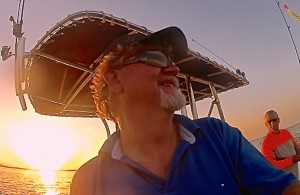 I recently realized that I was missing a lot of what goes on around me when I’m fishing in the Chesapeake Bay due to weakened eyesight. Up to now, I’ve been purchasing drug-store reading glasses that I’d carry around in my tackle bag and drag out whenever I needed to tie on a lure. That worked fine until I started missing little details that my fishing partners were picking up on. I’ve always prided myself in being the first one on the boat to pick up working birds on the horizon. After almost a year of listening to others say, “Do you see those birds?,” I decided reading glasses aren’t enough, and it’s time to make the change to prescription glasses. Since I wear sunglasses most of the time when I’m fishing, I moved on to prescription sunglasses as well.
I recently realized that I was missing a lot of what goes on around me when I’m fishing in the Chesapeake Bay due to weakened eyesight. Up to now, I’ve been purchasing drug-store reading glasses that I’d carry around in my tackle bag and drag out whenever I needed to tie on a lure. That worked fine until I started missing little details that my fishing partners were picking up on. I’ve always prided myself in being the first one on the boat to pick up working birds on the horizon. After almost a year of listening to others say, “Do you see those birds?,” I decided reading glasses aren’t enough, and it’s time to make the change to prescription glasses. Since I wear sunglasses most of the time when I’m fishing, I moved on to prescription sunglasses as well.
 It turns out there’s a lot more to know about sunglasses than I thought. I went for many years using the cheapest sunglasses I could find. I’m paying for that mistake now with diminished vision and hypersensitivity to light. It all comes down to ultraviolet (UV) rays. Inexpensive, off-the-rack sunglasses provide very little or no UV protection. They darken your vision, but they don’t block the damaging rays. The darkening causes your iris to open wider than usual and allow more light, and therefore more UV rays, to injure your eyes. You don’t notice it so much when you’re young, but as you get older, it becomes a lot more obvious.
It turns out there’s a lot more to know about sunglasses than I thought. I went for many years using the cheapest sunglasses I could find. I’m paying for that mistake now with diminished vision and hypersensitivity to light. It all comes down to ultraviolet (UV) rays. Inexpensive, off-the-rack sunglasses provide very little or no UV protection. They darken your vision, but they don’t block the damaging rays. The darkening causes your iris to open wider than usual and allow more light, and therefore more UV rays, to injure your eyes. You don’t notice it so much when you’re young, but as you get older, it becomes a lot more obvious.
My search for the right sunglasses started with some background research about polarization. I learned that light waves normally enter our eyes from all directions. When light is reflected from a surface – like water – the waves orient themselves along a single, horizontal axis. When the waves line up, it’s called polarization and results in very bright concentrations of light. It’s not only harmful to the eye, but it can make it difficult to see clearly.
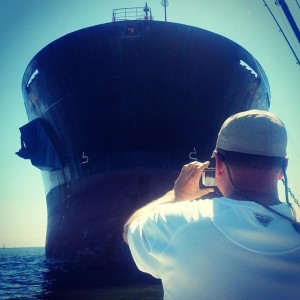 1. It was still a beautiful day on the water.
1. It was still a beautiful day on the water.
2. That’s why they call it fishing, not catching.
3. I don’t go to catch fish, I go to relax.
4. It was a nice day for a boat ride.
5. I just needed to run the engine.
6. There was a good band playing at The Jetty, so we came in early.
7. It’s not how many fish you catch, it’s how good you look fishing.
8. I just wanted to work on my tan.
9. I enjoy bird watching as much as catching fish.
10. I didn’t get skunked, I ran out of time. Read More!
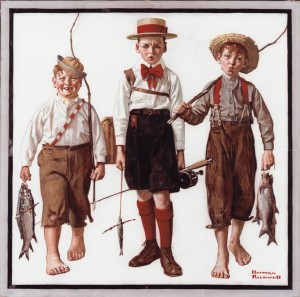 Been fishing lately? If you have, I bet you’ve noticed that there are a lot of suspended fish this time of year. There’s nothing more frustrating to Chesapeake Bay light tackle fishermen than to see nice marks on the fish finder, then not get bites. How do you catch those finicky suspended rockfish? Frankly, it’s tough, but there are some things you can do to increase your chances. To start, consider what’s going on below the surface.
Been fishing lately? If you have, I bet you’ve noticed that there are a lot of suspended fish this time of year. There’s nothing more frustrating to Chesapeake Bay light tackle fishermen than to see nice marks on the fish finder, then not get bites. How do you catch those finicky suspended rockfish? Frankly, it’s tough, but there are some things you can do to increase your chances. To start, consider what’s going on below the surface.
1. Scope Out The Situation – Stripers adjust their feeding habits depending on conditions. Since the Chesapeake Bay is an estuary, conditions can change frequently. Sometimes changes are short-term like those brought on by tides and currents. Sometimes, they last longer like with seasonal water-temperature adjustments. There are even cases where conditions can change for years at a time.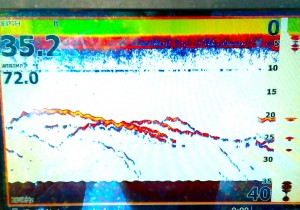
In the near-decade that I’ve been fishing the Chesapeake, I’ve noticed a change, particularly in the warmer months, to more fish feeding in temperate mid-level zones in open water. This can happen when the water conditions on the surface are not as comfortable as they are farther down. In the spring when we get a lot of rain, storm water runs off polluted roads, parking lots, fertilized lawns, and farmer’s fields resulting in a surface layer of unsalted, polluted water. Stripers will come up to feed in this layer when conditions are good and when they’re very hungry, but they’ll drop back down into the comfort zone when they aren’t extremely active. They usually won’t swim down deeper than forty feet or so because the water down deep may not hold enough oxygen, or the temperature or salinity can be uncomfortable for them. Read More!
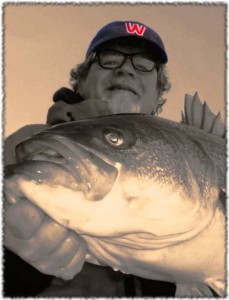 “I only write when I’m inspired,” wrote William Faulkner. I’d find that statement comforting if he hadn’t followed it with, “and I’m inspired every morning at 9:00 AM.” Lately, my every-morning-at-9:00 AM-ritual hasn’t included much writing. Oh, I’ve had plenty to write about, it’s just that I’ve overcommitted myself (again) so that every spare waking minute seems filled with obligation. When I have some spare time, I usually go fishing. Since I bet you’d much rather hear about the fishing than the excuses, I’ll dive right in.
“I only write when I’m inspired,” wrote William Faulkner. I’d find that statement comforting if he hadn’t followed it with, “and I’m inspired every morning at 9:00 AM.” Lately, my every-morning-at-9:00 AM-ritual hasn’t included much writing. Oh, I’ve had plenty to write about, it’s just that I’ve overcommitted myself (again) so that every spare waking minute seems filled with obligation. When I have some spare time, I usually go fishing. Since I bet you’d much rather hear about the fishing than the excuses, I’ll dive right in.
If the paragraph above sounds familiar, it’s because it’s a re-run from an article I posted here on ChesapeakeLightTackle.com in April two years ago. I guess what goes around always comes back, and once again I’m struggling to keep too many plates spinning in the air. I sometimes have to scale down, tune out, and just fish. If I haven’t returned an email or phone call recently, I apologize. The good news is that things are starting to settle down and I’ve found a few minutes for a fishing report and a word or two of advice.
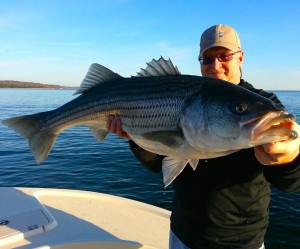 I bet you’re aware that the rockfish catch and kill season opens this Saturday in Maryland. While I enjoy seeing people get excited about fishing, I always dread the start of the kill season. Opening Day doesn’t mean much to fishermen who are in it for the simple joy of fishing. Most of us have been catching and releasing fish all winter. We fish because we love the sport, not because it puts meat on the table. I like to eat fish too, but you won’t see me keeping any big stripers this trophy season. Read More!
I bet you’re aware that the rockfish catch and kill season opens this Saturday in Maryland. While I enjoy seeing people get excited about fishing, I always dread the start of the kill season. Opening Day doesn’t mean much to fishermen who are in it for the simple joy of fishing. Most of us have been catching and releasing fish all winter. We fish because we love the sport, not because it puts meat on the table. I like to eat fish too, but you won’t see me keeping any big stripers this trophy season. Read More!
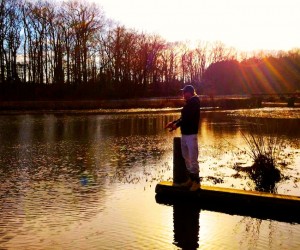 I am haunted by waters. – Norman Maclean
I am haunted by waters. – Norman Maclean
Why do you fish?
Recently, I put that question to some of the best fishermen I know, anglers with the right stuff who are continually successful. Their responses might surprise you. It isn’t a love of nature, the quest for solitude, or the thrill of the fight that drives them. Instead, they look at me with a what-kind-of-crazy-question-is-that glare and answer simply, BECAUSE I HAVE TO.
I get it. This winter has been hard on Chesapeake Bay anglers. Because of bad weather, opportunities to fish have been limited. It’s frustrating to the point of resentment. Take a look at any online discussion forum in the winter and you’ll see that some guys (and gals) take their frustrations out on their fellow anglers. Here’s what I think this frustration might look like in the format of a popular television commercial:
When you can’t fish, you get angry. When you get angry, you growl at people and animals. When you growl at animals, they growl back and you get chased by a bear. When you get chased by a bear, it shreds your pants and you hide naked in your neighbor’s garage. When you hide naked in your neighbor’s garage, her husband comes home and shoots holes in your boat. Don’t get holes shot in your boat. Go fishing. Read More!
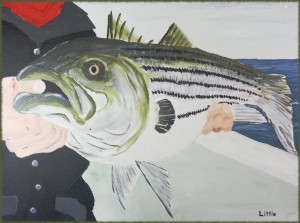 Are you ever surprised when someone you know to be a good angler turns out to be an artist? How many fishermen have you met that are also painters, writers, builders, etc? After hanging around fish and fishermen for more than fifty years, it has become clear to me that fishing attracts creative thinkers. Fishing, by its very nature requires artistry, innovation, and experimentation. It frequently compels us to turn loose of what we know, and reach out for things we hope for.
Are you ever surprised when someone you know to be a good angler turns out to be an artist? How many fishermen have you met that are also painters, writers, builders, etc? After hanging around fish and fishermen for more than fifty years, it has become clear to me that fishing attracts creative thinkers. Fishing, by its very nature requires artistry, innovation, and experimentation. It frequently compels us to turn loose of what we know, and reach out for things we hope for.
Everyone should believe in something; I believe I’ll go fishing. – Henry David Thoreau
By now, you’ve probably heard me say that it’s the bad days that make us better fishermen. Catching is easy when fish are biting, and almost any lure you throw in the water will work. Conversely, it’s the tough days that require us to get creative and use the less logical side of our brains. My fishing partner Jamie Clough tells a story about an ancient old fly fisherman who has frequented the meat counter where he works for more than a decade. On each visit, he mentions a spot he used to fish where he caught big speckled trout. His secret fishing hole was right under everyone’s nose and smack in the middle of one of the highest-traffic areas in the Chesapeake Bay. Jamie says he’d smile and nod at the stories, but never gave them a second thought until one day last summer. After an unsuccessful and frustrating morning, he decided to check out the old guy’s unlikely trout spot. Can you guess what happened next? It’s a safe bet that Jamie will never pass by that spot again, and I’m thinking that gentlemen gets an extra-thick ribeye once in a while. Read More!


